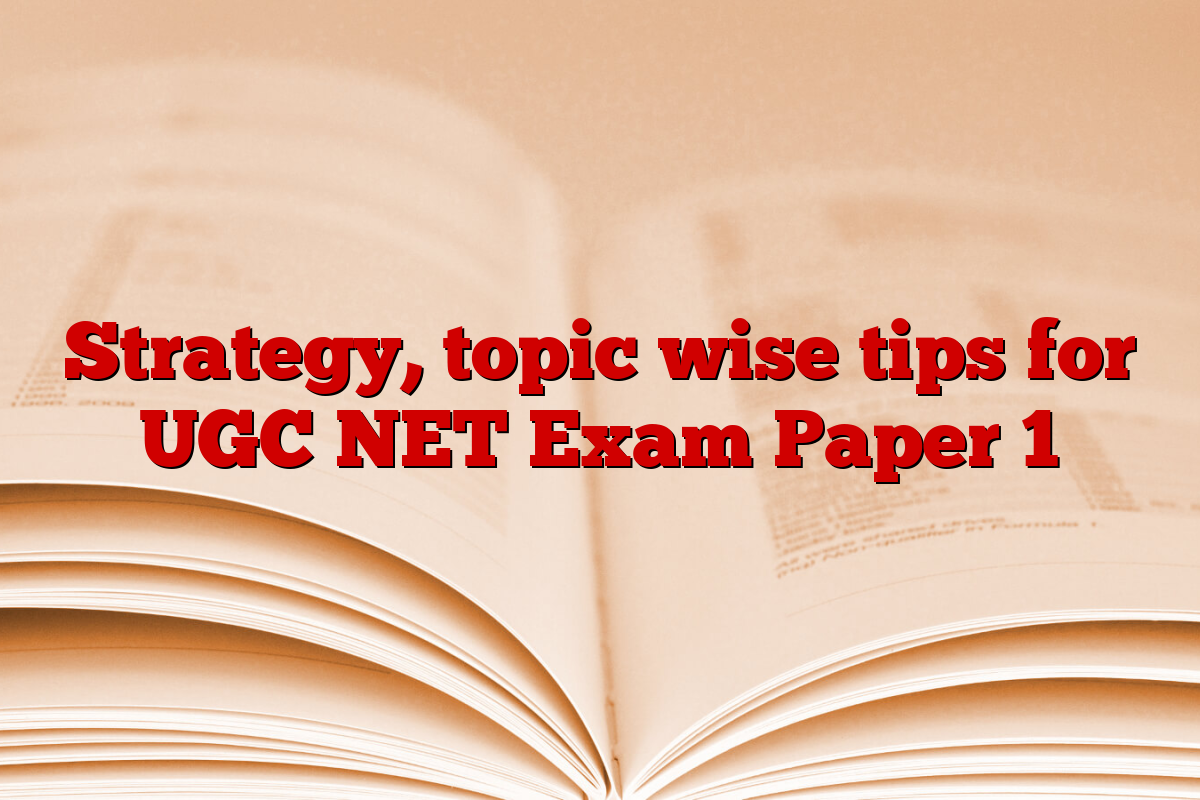UGC NET (University Grants Commission – National Eligibility Test) is a national level examination conducted by the National Testing Agency (NTA). This examination checks the eligibility of candidates for JRF (Junior Research Fellowship) and Assistant Professor or NET only. NTA UGC NET December Exam 2024 will be conducted on 1-19 January 2025. So, candidates start their preparation and Studytoper brings to you the strategy to prepare and crack NET Exam 2024.
ugc net exam pattern
UGC NET aspirants must go through the UGC NET Exam Pattern 2024 to understand its intricacies. Candidates will have to appear for two papers- Paper-I (General for all) and Paper-II (Relevant Subject).
- UGC NET Exam Pattern 2024 consists of two papers
- UGC NET Paper I: Total Questions – 50 questions, total marks – 100 points
- UGC NET Paper-II: Total Questions -100 questions, total marks – 200 points
- The examination will be conducted in the same session, Without any break.
- Paper I is common for all examinations, and applicants can choose Paper-II for specialization from a list of about 100 subjects.
- Exam Nature: Bilingual (English and Hindi)
- Exam Mode: Online
- UGC NET Paper I Subject: People and Environment, Higher Education System: Governance, Politics and Administration, Data Interpretation, Information and Communication Technology (ICT), Logical Reasoning, Communication, Reasoning (including Mathematics), Reading Comprehension, Teaching Aptitude, Research Aptitude
- UGC NET Paper II Subject: Depending on the subject chosen by the applicants.
- Criteria to qualify UGC NET: Paper – I & II 40% marks in each paper
Strategy for UGC NET Exam Paper 1
UGC NET Exam Paper 1 is designed to assess the teaching and research aptitude of the candidates. It is essential for each unit to have a strategic approach to prepare effectively. A detailed strategy for each topic-wise unit is given below.
Unit 1: Teaching Qualifications
- understand teaching concepts: Focus on principles, levels and characteristics of teaching.
- Learner Characteristics: Study the various characteristics of the learner and how they affect learning.
- teaching methods: Familiarize yourself with different teaching methods and tools.
- appraisal system: Understand various evaluation systems and their applications.
Unit 2: Research Aptitude
- Basic principles of research: Learn about the types, characteristics, and ethics of research.
- Research Methods: Study various research methods and their applications.
- Thesis and Article Writing: Understand the structure and components of theses and research articles.
- sampling techniques: Familiarize yourself with various sampling techniques and their uses.
Unit 3: Understanding
- reading practice: Practice reading comprehensible paragraphs regularly.
- critical analysis: Develop the skill of analyzing and interpreting a given text.
- custom question: Solve previous years’ comprehension questions to understand the pattern.
Unit 4: Communication
- communication basics: Study the basics of communication, including types and barriers.
- effective communication: Learn techniques for effective communication.
- classroom communication: Understand the importance of communication in teaching.
Unit 5: Mathematical Reasoning and Aptitude
- basic concepts: Refresh your knowledge about basic mathematical concepts.
- logical problems: Practice solving logical and analytical problems.
- custom question: Solve previous years’ questions to get familiar with the types of problems.
Unit 6: Logical Reasoning
- types of logic: Study different types of arguments – deductive, inductive, analogies, etc.
- practice problems: Practice logic problems regularly.
- past papers: Review previous paper questions to understand the reasoning patterns.
Unit 7: Data Interpretation
- data types: Learn to interpret different types of data representations.
- calculation speed: Improve your speed and accuracy in calculations.
- practice set: Solve various data interpretation sets from previous exams.
Unit 8: Information and Communication Technology (ICT)
- Basics of ICT: Understand the basic concepts of ICT and its applications.
- use in education: Learn about the role of ICT in education.
- current trend: Stay updated with the latest trends and developments in ICT.
Unit 9: People, Development and Environment
- environmental issues: Study major environmental issues and policies.
- sustainable development: Understand the concept of sustainable development.
- human and social development: Learn about human and social development indicators.
Unit 10: Higher Education System
- education policies: Study the history and current policies of the higher education system.
- Institutions and bodies: Learn about different higher education institutions and regulatory bodies.
- quality and governance: Understand issues related to quality and governance in higher education.
Tips to prepare for UGC NET exam
Before you start preparing, here we have given tips for UGC NET exam.
- Understand the syllabus and exam pattern thoroughly.
- Make a study schedule and stick to it.
- Gather quality study materials and resources.
- Practice previous years question papers and mock tests.
- Focus on strengthening conceptual understanding.
- Take regular breaks to avoid burnout.
- Stay updated with current affairs and developments in your area.
- Form study groups or seek guidance from advisors.
- Revision and review regularly to strengthen your knowledge.
- Remain calm and confident on the day of the exam.
sharing is Caring!
